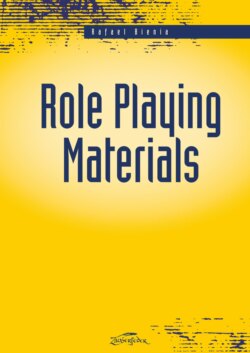Читать книгу Role Playing Materials - Rafael Bienia - Страница 7
На сайте Литреса книга снята с продажи.
ACKNOWLEDGEMENTS
ОглавлениеThis dissertation is a network that includes many people who supported me during the past years. Let me take some time and say my thanks.
First of all, I want to thank my supervisors Sally Wyatt and Karin Wenz. Your support and guidance helped me to stay on track without losing my enthusiasm for the diversity of academic work. Your detailed and constructive feedback improved my academic skills immensely.
This dissertation was part of the NWO funded project “Narrative Fan Practices” led by Karin Wenz. With Karin, Nicolle Lamerichs, and Maarten Michielse, I was in the lucky position to be part of a team of excellent scholars. From our joint work, I learned the visible and invisible trades of our profession and I can only hope that my contribution was of any help to you.
To Lotte and Maarten. I enjoyed every time we shared so far. Whether it was a cappuccino with Lotte to discuss our chapters, or a chocomel with Maarten at Bandito’s – it was always a pleasure to see you. I am glad that you became my paranymphs. Paranymphs are basically two angels taking care of the nervous wreck before, during, and after the defense. Whatever happens, thank you for this in advance!
To my colleagues at the Faculty of Arts and Social Sciences (FASoS) in general and the research program Arts, Media and Culture (AMC) in particular. AMC has made me feel at home, treating me as a proper colleague, giving me opportunities to teach in your courses, give lectures, and contribute to this wonderful community. Special thanks to Louis van den Hengel, Jack Post, Daniel Stinsky, and Renée van de Vall. I am grateful for the meetings of our Media & Aesthetics group led by Ike Kamphof, who also helped me as my BKO coach to master Problem Based Learning.
To my colleagues of the research program Maastricht University – Science, Technology and Society Studies (MUSTS). I had the opportunity to benefit from your advice, feedback, and an open ear during several lectures, an introductory course, and one summer workshop. Special thanks to Wiebe Bijker, Karin Bijsterveld, Jessica Mesman, Bernike Pasveer, and Julia Quartz-Topp.
To the reading group on Practice Theory, initiated by Jessica Mesman, it was a great opportunity to see and learn with colleagues from both programs, AMC and MUSTS. I am grateful to have been part of this fruitful collaboration within FASoS, because I experienced how interdisciplinary work really works within a faculty.
Many thanks to Geert Somsen and Alexandra Supper who led the graduate school and who were always keen on improving the diversity of topics of lectures and workshops. I had the opportunity to contribute several times with workshops and profited from many sessions on the life around a Ph.D.
My thanks towards the national Research School for Media Studies (RMeS) and the former director José van Dijk. The Winter and Summer Schools have always been an invigorating experience of discussing and learning more about the work of my fellow Ph.D. colleagues in the Netherlands. Presenting my own work was a great chance to receive constructive feedback. Thanks above all to Alex Gekker, Nils Kerssens, Lela Mosemghvdlishvili, Birte Schohaus, Rik Smit for your pleasant and stimulating company. Taking part in the research school activities showed me different universities in the Netherlands.
In the past years, my travels went beyond the Netherlands. A big thank you to my colleagues for their constructive feedback throughout the years: Benjamin Beil, J.T. Harviainen, Nathan Hook, Jonas Linderoth, Michał Mochocki, Torill Mortensen, Jan Salge, Jaakko Stenros, and Annika Waern.
Thanks to the publishers of my first articles and books: Benjamin Beil and Thomas Hensel, Benjamin Bigl and Sebastian Stoppe, Sarah Lynne Bowman, Andrea Castellani, Sebastian Deterding and José Zagal, Karsten Dombrowski, Evan Torner, and Jutta Zaremba. Also thanks to Gerke Schlickmann for co-editing the MittelPunkt books with me.
I want to thank the communities of role playing for joining me in my field work, letting me play with them, their countless conversations, help, and interest in my work. Beside my interviewees (see Appendix B), I want to thank Mercedes Buyala, Michael Hess, and Matthias Trennheuser. Above all, my thanks to all of you who have made it possible for me to go to Alcyon XVI: Frances Arndt, Maria Angelika De Barros-Alves, Bastian Heer, Kelric, Julia Kieper, Flo Krell, Lu, Nummi, Franzi Schöttner, Max Stark, and my larp brothers Martin Strzodka and Mike Tascona.
To my office mates. Eli’s calm attitude was the right antidote to my somewhat cliché nervousness of a Ph.D. candidate. You had always a moment to talk and our family meetings will be kept dear in our memories. Two years later, Assem moved in. I am grateful for your company and the many talks we had about coffee, sports, politics, and religious studies.
To Peter Waldmann who had always faith in me as a scholar. I tried to follow your example of a teacher during my time in Maastricht.
To Thomas Hensel who took care of my first steps as a Ph.D. candidate and who linked me to ANT at University of Siegen.
To my family. Thanks to my parents for your support and faith in my curiosity from early on. Thanks to my brother for your support and your special way to make this world a piece of art.
To my wife. Thank you for this better life. Without your right words at the right time, I would not have applied to what seemed and became the most spectacular job I have ever had so far. Thank you for your support during these long years.
This network does not end here and I want to thank all future readers for their interest.
